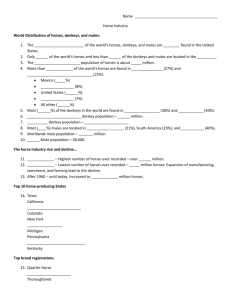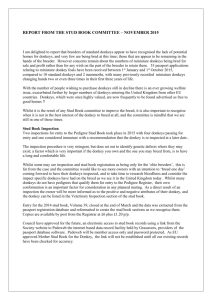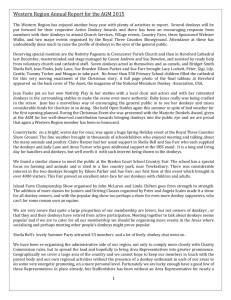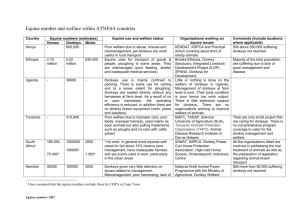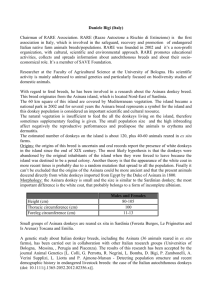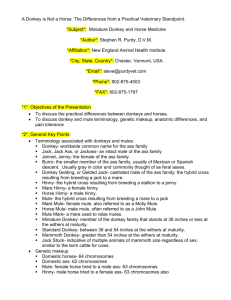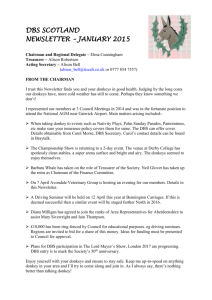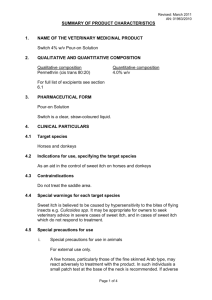"Man and Beast You deliver, O Lord" (Ps. 36:7)
advertisement
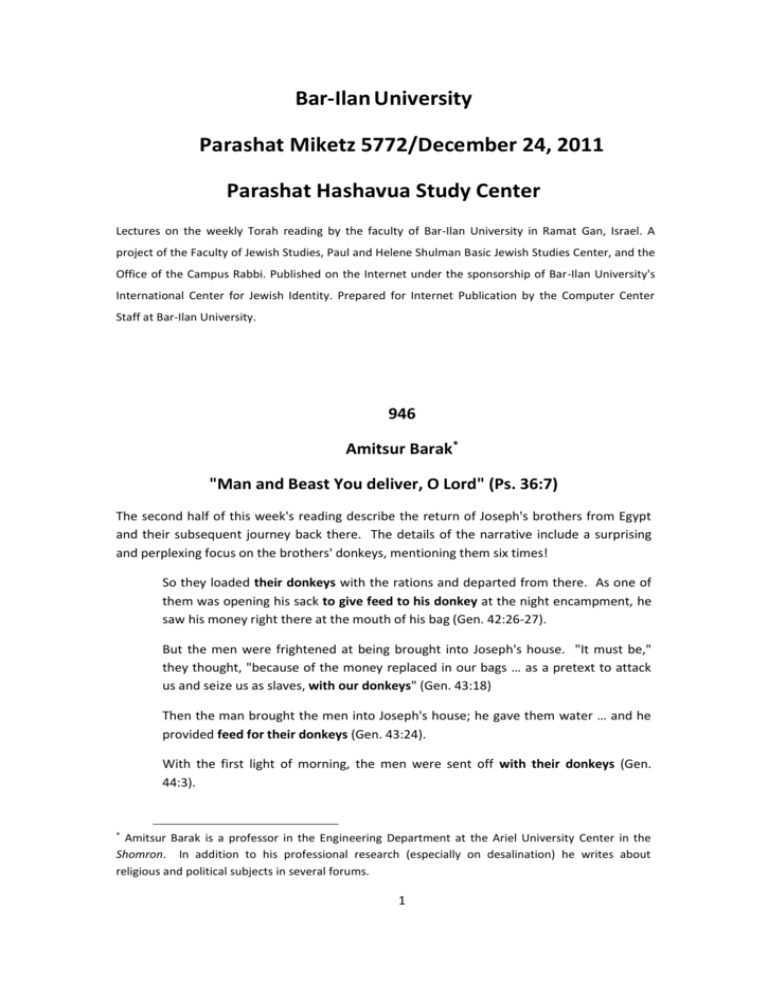
Bar-Ilan University Parashat Miketz 5772/December 24, 2011 Parashat Hashavua Study Center Lectures on the weekly Torah reading by the faculty of Bar-Ilan University in Ramat Gan, Israel. A project of the Faculty of Jewish Studies, Paul and Helene Shulman Basic Jewish Studies Center, and the Office of the Campus Rabbi. Published on the Internet under the sponsorship of Bar-Ilan University's International Center for Jewish Identity. Prepared for Internet Publication by the Computer Center Staff at Bar-Ilan University. 946 Amitsur Barak* "Man and Beast You deliver, O Lord" (Ps. 36:7) The second half of this week's reading describe the return of Joseph's brothers from Egypt and their subsequent journey back there. The details of the narrative include a surprising and perplexing focus on the brothers' donkeys, mentioning them six times! So they loaded their donkeys with the rations and departed from there. As one of them was opening his sack to give feed to his donkey at the night encampment, he saw his money right there at the mouth of his bag (Gen. 42:26-27). But the men were frightened at being brought into Joseph's house. "It must be," they thought, "because of the money replaced in our bags … as a pretext to attack us and seize us as slaves, with our donkeys" (Gen. 43:18) Then the man brought the men into Joseph's house; he gave them water … and he provided feed for their donkeys (Gen. 43:24). With the first light of morning, the men were sent off with their donkeys (Gen. 44:3). * Amitsur Barak is a professor in the Engineering Department at the Ariel University Center in the Shomron. In addition to his professional research (especially on desalination) he writes about religious and political subjects in several forums. 1 At this they rent their clothes. Each reloaded his donkey, and they returned to the city (Gen. 44:13). If one reads this narrative, omitting the references to the donkeys, in terms of the plot there does not seem to be any important information lacking to the reader. This raises the following questions: 1. What is the reason for mentioning the donkeys at all, and why so many times at that? 2. Is there anything special about these donkeys or their relationship to their owners that requires attention? 3. Are there any messages being conveyed beyond the plot? These questions become all the more poignant in the light of other passages that reveal similar findings: Mentioning the donkey in one of the founding events of our history – the binding of Isaac – appears superfluous insofar as the plot is concerned, especially in view of it being mentioned twice (Gen. 22). A double question presents itself here: what importance is there to informing us that the donkey was left with his servants, and why was the donkey not taken to help the elderly Abraham up the mountain along with Isaac? If not for them to ride, at least it could have helped carry the wood! In terms of the plot there also seems to be no point in mentioning Moses' donkey when he returned from Midian to Egypt: "So Moses took his wife and sons, mounted them on a donkey, and went back to the land of Egypt" (Ex. 4:20). In one of the more famous prophetic passages, a donkey appears as the beast on which the Messiah will ride: "Raise a shout, Fair Jerusalem! Lo, your king is coming to you… Yet humble, riding on a donkey, on a donkey foaled by a she-donkey" (Zech. 9:9). The Sages connected the above three references into a single homily (cf. Yalkut Shimoni): "[Moses] mounted them on a donkey – a special donkey, namely the one that Abraham had saddled for the binding of Isaac and upon which the Messiah is destined to appear" (cf. Rashi on Ex. 4:20). This homily provides a partial answer to the above questions: indeed, the donkey is a special animal. Donkeys are first mentioned in Scripture in conjunction with Abraham being in Egypt: "And because of her, it went well with Abram; he acquired sheep, oxen, donkeys, male and female slaves, she-donkeys, and camels" (Gen. 12:16). Several things are strange about this list of presents: a) the detail – one could simply have written "livestock and slaves"; b) only with respect to donkeys is special mention made of male and female; c) the logical hierarchical presentation would have put 2 slaves at the beginning or end of the list, but not in the middle and surely not between donkeys and she-donkeys. Likewise, in Parashat Va-Yigash there appears to be unnecessary detailing of male and female animals in the list of pack animals: "And to his father he sent the following: ten he-donkeys laden with the best things of Egypt, and ten she-donkeys laden with grain, bread, and provisions for his father on the journey" (Gen. 45:23). One could have been less wordy and simply written, "twenty donkeys laden with the best things of Egypt, as well as grain, bread, and provisions." Donkeys are mentioned several times in Judges, and in three instances the reference is seemingly superfluous: You riders on tawny she-donkeys, you who sit on saddle rugs, and you wayfarers, declare it! (Judges 5:10). After him arose Jair the Gileadite… He had thirty sons, who rode on thirty burros" (Judges 10:3-4). After him, Abdon son of Hillel the Pirathonite led Israel. He had forty sons and thirty grandsons, who rode on seventy donkeys (Judges 12:13-14). We suggest the following partial answers: Regarding the first question, it can be said that the general treatment of animals in Scripture is extensive and requires broad separate discussion, part of which would be to focus on donkeys, as we are doing here. The uniqueness of donkeys finds expression in several other places in Scripture: Donkeys are the only animal in Scripture that require redemption of the firstborn.1 Balaam's she-donkey is the only animal described as having superior spirituality. Aside from her power of speech, she also was able to see the angel of the Lord, who had not been seen by Balaam, whose prophecies, according to the Sages, were on an equivalent level to Moses'. Both the snake in the Garden of Eden and the fish that swallowed Jonah received messages from the Lord but they did not see Him. If there is no clear hierarchy in the list in Genesis 12:16, perhaps the verse is hinting that human beings and beasts, especially donkeys, are equivalent or close in status to one another, as in the saying of the wisest of men: "For in respect of the fate of man and the fate of beast, they have one and the same fate: … both have the same lifebreath; man has no superiority over beast,… Who knows if a man's lifebreath does rise upward and if a beast's breath does sink down into the earth?" (Eccles. 3:19-21). This message could provide a partial answer to the questions above. 1 Daily in the morning prayers, mention is made of Abraham's donkey in the story of the binding of Isaac and of the command to redeem firstborn donkeys. 3 Another possible answer to the first three questions, albeit prosaic, concerns the wide variety of functions served by the donkey as opposed to other animals: for riding (unlike sheep and cattle), as a pack animal (unlike horses), and for plowing (unlike camels). Unlike the case with sheep and cattle, the donkey is not a source of food or clothing but is entirely a beast used for its strength and assistance. It is also easy to care for and control, given its more convenient size than other work animals. One should bear in mind that in the technology of those times work animals were the most readily available source of work energy, and hence their importance. A message one could deduce from this week's reading concerns our responsibility as human beings to see to the well-being and proper sustenance of the animals in our possession. This can be learned both from the expressions that are not essential to the plot, such as "to give feed to his donkey," and from the information that the Torah conveys us about the brothers' fears lest the Egyptian want "to seize us as slaves, with our donkeys." If the brothers were to be enslaved, why need they worry about how their donkeys would fare? What does the reader care if the donkeys are enslaved? The Torah here is teaching us about our responsibility for the well-being of our animals. Another crucial message is to "comport oneself modestly," not only as a call for proper behavior but also as a way of life actually characterizing our nation in the past and future, as distinguished from the other nations of the world, who ride on horses: from Abraham, who notwithstanding his great wealth and status chose to ride on the lowliest of animals, to the Messiah who despite his greatness will come on an donkey, not a horse. This message sits well with the contrast between the lowly donkey, representing humility, and the lofty horse, representing pride. It is the way of the world for kings to sit astride horses, and the squares of the world's major cities are decorated with statues of kings mounted on mighty horses. The strength of classical armed forces was also based on horsemen and chariots. But among the Israelites, paradoxically, horses were neither in demand nor much to be found. The patriarchs and the Israelites leaving Egypt had sheep and cattle, camels and donkeys, but not horses. Those were had by the Egyptians! Horses are first mentioned in Scripture (in Parashat Va-Yigash) at the top of the list of animals that Joseph acquired for Pharaoh. Later (in Parashat Va-Yehi) they are mentioned in connection with the expedition to bury Jacob. They are also mentioned at the top of the list of animals stricken by pestilence (in Parashat Va-Era), and prominently in the description of the Egyptian's pursuit of the Israelites as far as the Red Sea. Generally our enemies set out to attack us on horseback: "When you take the field against your enemies, and see horses and chariots … have no fear of them" (Deut. 20:1). Moreover, the Torah forbids the kings of Israel to acquire many horses, but instructs them to practice humility and modesty: "He shall not keep many horses… Thus he will not act haughtily towards his fellows" (Deut. 17:16-20). The paradox in the proscription against having many horses finds expression in building the armed forces: taking advantage of the chariots and horses that fell into our hands as booty from battle would be perfectly natural and quite to be expected; but the Lord forbade 4 Joshua to use this booty: "But the Lord said to Joshua, … tomorrow at this time I will have them all lying slain before Israel. You shall hamstring their horses and burn their chariots" (Josh. 11:6). David followed in Joshua's footsteps, without being explicitly commanded: "David captured 1,700 horsemen … and David hamstrung all the chariot horses, except for 100 which he retained" (II Sam. 8:4). To our great surprise, his son Solomon violated the proscription against having many horses: "Solomon had 40,000 stalls of horses for his chariotry and 12,000 horsemen" (I Kings 5:6), and thus the degeneration of his reign began. Let us hope that the people of Israel will ultimately be redeemed when we return to the humility represented by the Messiah: "Lo, you king is coming to you. He is victorious, triumphant, yet humble, riding on a donkey" (Zech. 9:9). 5
